- Home
- H A CULLEY
WHITEBLADE: Kings of Northumbria Book 1 Page 3
WHITEBLADE: Kings of Northumbria Book 1 Read online
Page 3
The monk was stunned by Aidan’s courage and meekly allowed himself to be led from the place. However, the man who had been humiliated wasn’t content to allow them to go unmolested, as the others were. He retrieved his spear and hurled it at the retreating pair. He had aimed at Aidan and it was Aidan he hit. The boy felt a sudden thump in his shoulder and after a few seconds he fell to the ground screaming when the pain hit him; then searing agony coursed through his small frame and he was unable to move.
Finnian ignored him at first, turned on his heel and walked slowly and deliberately back towards the rotund man who had thrown the spear. The fellow quailed before his angry gaze and fell to his knees, mumbling like an idiot, while the others watched in amazement. They made no move to help the man or to attack the monk, as he raised the crucifix he wore hanging from the rope around his waist to his lips, kissed it and held it over the quivering man. He told him that the wrath of God and Christ his beloved son would be visited on him for the rest of his days. Then he turned on his heel and went to help Aidan.
The inhabitants pulled the mumbling wretch to his feet and led him away, casting superstitious glances over their shoulders at the monk. The crowd of women and children who had come to watch, expecting to see the monk and his boy beaten to death, broke up in silence, wondering at the power of the monk. Had Finnian stayed, he could probably have converted the settlement, so in awe of him were they, but his priority was to save the boy.
Luckily the thrown spear had lacked power and the point had ricocheted off the left scapula. Finnian searched in his pouch and gave the boy some herbs to chew on. A short while later Aidan lost consciousness and the monk was able to pull the spear point out. Immediately the wound started to bleed copiously and Finnian wondered how he was going to staunch it. He sensed rather than heard a movement behind him, but instinctively he knew it wasn’t a threatening one.
A girl knelt beside him and handed him a clean cloth and a bowl of water. Finnian cleaned the wound and pressed the cloth over it whilst he took a bone needle and a length of catgut from the girl. He expertly stitched the two flaps of skin together, washed the blood away and then bound a fresh bandage in place. He nodded his thanks to the girl who, without a word, gathered up the bowl, soiled rags and the needle and went back into the settlement. Finnian picked up the unconscious Aidan with one arm around his shoulders and the other under his knees and carried him away without looking back.
The monk was near the point of exhaustion when he came to another settlement. This one was on the coast and it was inhabited by Ulaidh fishermen, some of who were trained warriors. These wanted to launch a reprisal raid on the place where Aidan had been attacked, but Finnian and the local priest managed to persuade the headman that this would only stir up the whole area which, up to that point, was enjoying a short period of relative peace.
The priest led the way into his hut and they laid Aidan down on the rough-hewn table so that Finnian could examine the wound. He took off the bandage and cut through the stitches so that he could see inside. He gently explored the wound and found that a bit of bone had been chipped away, but the spear hadn’t broken the scapula. Using a pair of bone tweezers, he pulled the fragment out, washed the wound again and stitched it up once more. This time he poured a quantity of the priest’s whiskey into the gash before dressing it.
Finnian left Aidan with the Ulaidh whilst he continued with his mission to convert the Irish. It would be years before he saw him again.
~~~
Oswald was getting more and more angry. Connad, King of Dal Riada, sat on his throne on a raised platform at one end of his great hall at Dùn Add, a hillfort on top of a mound that dominated the surrounding flat lands. The nearby inlet of Craignish provided a natural safe harbour for his small fleet of birlinns.
‘My Lady, I would remind you that your husband, the cursed Æthelfrith, defeated my grandfather at the Battle of Degsastan a decade and a half ago. We were enemies then; why should I regard you differently now?’
‘Because Æthelfrith allowed your grandfather to continue to rule Dal Riada as an independent kingdom, merely insisting on a treaty of friendship between our peoples. He could just as easily have incorporated your lands within Northumbria.’
‘How generous of him,’ Connad sneered.
‘How dare you speak so to my mother, the daughter and wife of kings far greater than you, like that?’
Connad’s face suffused with anger.
‘You had better teach your whelp to mind his tongue, woman, or I will cut it out and make him my thrall.’
‘Be quiet, Oswald,’ Acha snapped. ‘You are not helping.’
‘King Connad.’ She turned back to the young man covered in a wolfskin, sitting on the throne. ‘It seems to me that you have three choices. You can either bid us leave in peace, or you can try and make us your thralls – in which case you will have a fight on your hands and you will lose more warriors, something you can ill afford after your recently setbacks in Ulster. The Ulaidh are losing ground to the Uí Néill and you are losing more warriors supporting your Christian allies than you can afford. After all, you are spread thinly on the ground from the Isle of Mull in the north to Kintyre in the south and you are beset by other enemies – the Picts and the Strathclyde Britons, to name but two. You need my men to bolster your numbers; and they are all trained warriors, not armed farmers,’ she added contemptuously, referring to the young men standing around the hall armed with no more than a rudimentary spear.
‘You mentioned a third option, my Lady?’ Connad asked softly.
‘We can join you and make common cause with you against your enemies.’
‘And what would you want in return?’
‘A safe home for me and my children.’
‘Hmm. I agree, but with two conditions.’
‘Which are?’
‘You, your men and your brood become Christians and your sons join my war band as soon as they attain fourteen summers.’
‘That seems fair, but fourteen is over young to go to war.’
‘No, you misunderstand. That is when they will be old enough to start their training as warriors. At sixteen they will be old enough and strong enough to fight.’
‘I see. And in the meantime?’
‘You may keep the four youngest with you for now and the baby, of course. The other two will leave for Iona on the morrow to become novice monks.’
After a pause, Acha nodded her head in agreement.
Oswald and Osguid had been excited by the talk of becoming warriors, but now they were to be shipped off alone to this place called Iona to become monks, a term they were unfamiliar with and they became anxious about what the future held for them.
Chapter Two – The Isle of Iona
618 AD
Oswald and Osguid ran down to the shore to meet the birlinn, which had just beached. The Master of Novices would beat them for leaving the abbey when they should have been practicing their reading of the scriptures, but the arrival of their brother Oslac, now ten, was an event not to be missed. However, the birlinn didn’t contain their younger brother, but fierce looking warriors who spoke a tongue not dissimilar to the Gaelic they had learned since their arrival, but with a strange accent.
The man who appeared to be their leader was dressed in a chain mail byrnie which came half way down his arms between elbow and wrist and just covered his knees. His metal helmet consisted of a rounded cap made from four pieces of iron riveted together and had a mask type of face guard around the eyes and nose. His neck was protected by a chain mail aventail. He had a sword and a shorter seax in leather-covered wooden scabbards hanging from the studded leather belt around his waist and he carried a throwing axe in his hand. Osguid thought that the overall effect was of a fearsome fighter and he felt scared. Not so Oswald. He coveted the helmet, armour and weapons and envied the man who could afford such things.
Several of the crew also wore byrnie and helmet, but many of these had obvious repairs and the majority
of the helmets were no more than segmented domed iron caps. Some wore leather jerkins to give their torsos some protection, but the majority wore simple tunics and brightly coloured trousers, gathered below the knee by ribbons wound around their legs.
A boy of perhaps thirteen or fourteen, presumably the leader’s son, leaped from the prow of the birlinn and came to stand by his side. He wore a jerkin made from some sort of animal fur, probably rabbit and a seax hung from his belt. He was bareheaded and his dark hair, encrusted with sea salt, hung in lank bunches down to his shoulders. Evidently it hadn’t been washed for a while.
The abbot of Iona, Fergno Britt mac Faílbi, stepped forward and welcomed the warrior, who pulled the helmet from his head. The two boys could see that he was an older version of his son, but with a long moustache and two scars which disfigured his face. When he smiled at the abbot he appeared to leer at him and looked even more frightening.
Oswald asked a monk standing nearby who he was and was told that it was Fiachnae mac Báetáin, King of the Ulaidh in Ulster and one of Connad’s sub-kings. He had apparently stopped at Iona to pray at the shrine of Saint Columba before continuing to Dùn Add to discuss the forthcoming campaign against the Uí Néill with the Dal Riadan king. Oswald and Osguid looked in awe at the other scars on his arms, as well as at the many arm rings he wore to indicate both his wealth and his success in battle. Oswald knew that many of them must have been taken from enemies he had killed in personal combat.
‘If you insist on running away like thralls trying to escape, you will be treated like slaves,’ the novice master told the brothers when they returned at last to the scriptorium, where their fellow novices were bent over their desks laboriously copying pages from an illuminated Bible.
‘We’re very sorry, Brother, but we thought it was the ship bringing our brother Oslac to Iona and thought it only polite to go and greet him,’ Oswald replied, trying to appear contrite and failing miserably.
‘Did you really? Well, as you have no doubt discovered, it is the King of Ulster and his son, Eochaid, who have honoured us with a visit.’
Oswald didn’t like to correct him and point out that Ulster was currently divided between several kings, only one of which was the redoubtable Fiachnae mac Báetáin.
‘Abbot Fergno has asked me to find a suitable novice to look after Eochaid whilst he is here with his father, which means doing whatever he so desires and so, Oswald, you have just selected yourself for the task.’
‘You make it sound as if I am to be his thrall, Brother.’
‘If that’s what you want to call it, well then, yes, you are to be his thrall whilst he is here. It is your penance for disobeying me. Perhaps it might teach you a little humility.’
‘I am not here to learn humility; I am here to learn about the Christian faith, which is something you have singularly failed to teach me about so far, Brother. May I remind you that I am the son of a King of Northumbria and nobody’s thrall?’
The Master of Novices grew puce with rage.
‘How dare you speak to me like that? You are here to learn to be a monk, that’s all I know and I care not who your dead father was. I will ask the abbot to have you flogged for your impudence to me.’
Oswald felt his own temper rising to match that of the furious monk, but he had enough sense not to exacerbate the situation. He regained control and forced himself to calm down. He bowed his head.
‘I apologise, Brother. I should not have spoken to you like that. However, I refuse to act as a thrall to some whelp spawned by a minor Irish chieftain. That is not why I and my brothers are here. King Connad was quite specific in his agreement with my mother, the Lady Acha. We were sent here to learn about Christianity prior to returning to be trained as warriors.’
‘I know nothing of this,’ the Master of Novices replied, not in the least mollified by Oswald’s attempt to smooth things over. ‘The rest of you get back to work; you too, Osguid. Oswald, you and I are going to take a little walk to see the abbot.’
After the monk had finished explaining Oswald’s transgressions to Fergno, the abbot looked a little uncomfortable.
‘It’s probably my fault for not explaining the situation with regard to the children of the Lady Acha, Brother. Oswald is correct. In fact, the ship carrying his brother, Oslac, is due to arrive here in the next day or two. The ship is a merchantman on its way to Ireland to trade. Oswald is to return to Dùn Add as soon as a ship going there arrives on Iona and I can secure passage on it for him. I agree that Oswald was quite wrong to speak to you, his superior, in the way that he did, but you say he did apologise? Good. Then let this be an end to the matter.’
The monk looked even angrier, if that were possible, but he held his tongue.
‘Now as to Eochaid, he too is travelling to Dùn Add to train as a warrior and I had thought, as he is only slightly younger than Oswald, that it might be a good idea if they became acquainted with one another. There is no question of Oswald becoming his servant, let alone his thrall. I really can’t think where you got that idea. I merely thought that Oswald might show Eochaid around the abbey and the island and explain our life here to him.’
‘I do think that you could have explained that to me, Father Abbot. It would have saved me from an embarrassing situation.’
‘Yes, well, I’ve said I apologise for that oversight. I don’t intend to repeat myself, Brother.’
‘No, of course not. Thank you, Father Abbot. Will that be all?’
‘Yes, thank you, Brother. Oswald, I expect you’ll find Eochaid in the guest hut. You had better go and introduce yourself.’
Oswald bowed slightly and followed the far from pacified Master of Novices out of the abbot’s cell. As soon as they were out of earshot, he turned and grabbed the front of Oswald’s habit.
‘You’ve made a fool of me in front of the abbot. You may be about to leave here, but I’m going to make your life hell before you do.’
‘I don’t think so.’ Oswald smiled sweetly at him. ‘If you do, I’ll return one night and quietly deprive you of the equipment hanging between your legs, which you have no use for in any case. You’ll never get a decent night’s sleep, wondering if that sound you heard outside the novices’ hall is me, coming for you, or just one of the dogs taking a piss.’
Oswald again smiled sweetly at the red-faced monk.
‘Now take your grubby hands off me so that I can go and find this Eochaid.’
As the monk stomped away angrily, Oswald didn’t feel particularly proud of himself. He knew that he was guilty of the sin of pride and that he had been unnecessarily insolent. The threat he’d made was just to get his own back on the man for the threat he’d made, but that still didn’t make it acceptable. However, he told himself, if a warrior, even a Christian one, didn’t have his pride and his honour, he was nothing – and would soon be a dead nothing, too. He forgot about the tiresome monk and set off to find Eochaid.
He wasn’t at all sure that he would want to get to know this boy, but he could see the abbot’s intention was a sensible one. If they did get on, then it would be valuable to have someone who was a friend during the tough days of warrior training that lay ahead of them. The trouble was that, from the brief sight of him he’d had down at the beach, Eochaid had seemed to be rather full of self-importance. He sighed and knocked on the rough-hewn door of the guest hut.
~~~
It had taken Aidan several months to recover and regain full use of his arm. Finnian hadn’t returned and so, to repay the inhabitants for their kindness in taking care of him, he joined them when they went out fishing and worked for nothing except for food and a corner of a hut in which to sleep. As often as he could, he would go and spend time with the settlement priest to learn more about Finnian’s religion. Unfortunately, the man only knew the rudiments and could answer only a few of the many questions the boy had.
‘I was a monk on Iona before I was ordained as a priest to come here and look after these people. Perhaps you should go t
here if you want to learn more,’ he told Aidan one day.
On a clear day Aidan could see Kintyre, one of the sub-kingdoms of Dal Riada, from the hill above the settlement, but the priest told him that Iona was off the tip of a larger island called Mull, some distance to the north of Kintyre. Nevertheless, Aidan often climbed the hill and gazed at that part of Dal Riada he could see across the relatively narrow stretch of water, then looked to the north where Iona lay over the horizon. For reasons he didn’t understand, he longed to make his way to the monastery on the small isle. Perhaps Finnian would be there? He missed the itinerant monk and his teachings. He had known so much more than the local priest.
After Aidan had been with the Ulaidh for over a year there had been a storm. That wasn’t unusual in the winter, but this was in the middle of summer and it was really severe with winds that howled around the squat huts in which the fishermen and their families lived. For miles around it tore ships free of their moorings so that they were either lost at sea or broken up on the rocks. One man who had ventured outside to check that his chickens were safe had been blown off his feet and had to crawl back to the safety of his hut.
In the morning, as the Ulaidh inspected the damage done by the storm to the settlement and the fishing currachs, they saw a birlinn in difficulties limping towards the beach. It had lost its mast and was being propelled by no more than eight oars, instead of the usual forty for a ship that size. As it got closer, they could see that those who were not rowing were frantically bailing out seawater, using everything they had, including helmets.
When they had managed to run the ship onto the sandy beach, the exhausted crew collapsed where they stood, except for one man who managed to haul himself over the side and stagger ashore. The inhabitants, uncertain whether the arrival was friend or foe, had armed themselves and watched as the lone figure wearily approached. As he drew closer, the headman recognised him as one of Connad’s chieftains from Lorne, an area of Dal Riada on the mainland opposite the Isles of Mull and Iona and rushed to his aid.

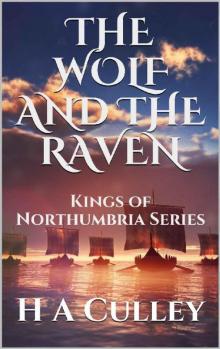 The Wolf and the Raven
The Wolf and the Raven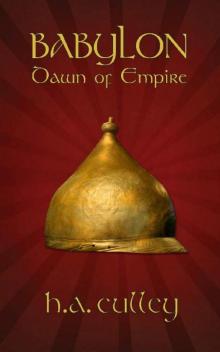 Dawn of Empire
Dawn of Empire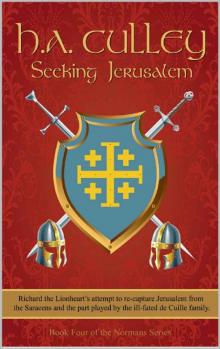 Seeking Jerusalem
Seeking Jerusalem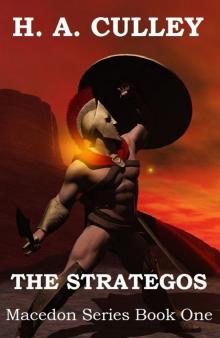 The Strategos
The Strategos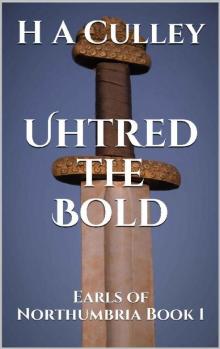 Uhtred the Bold
Uhtred the Bold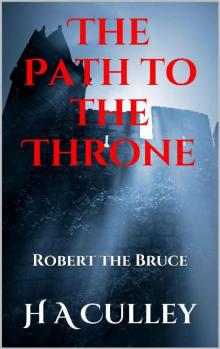 The Path to the Throne
The Path to the Throne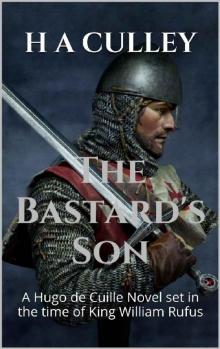 The Bastard's Son
The Bastard's Son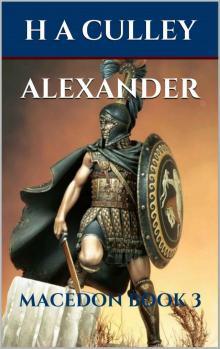 Alexander
Alexander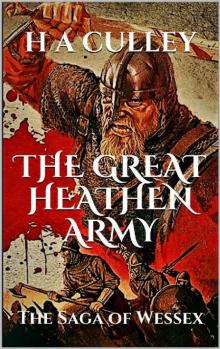 The Great Heathen Army
The Great Heathen Army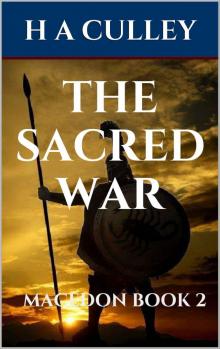 The Sacred War
The Sacred War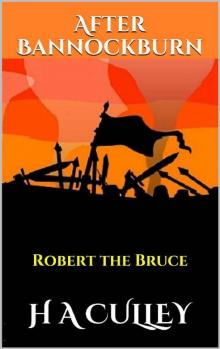 After Bannockburn
After Bannockburn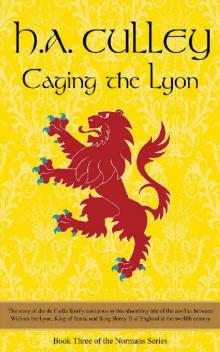 Caging the Lyon
Caging the Lyon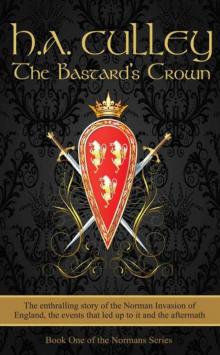 The Bastard's Crown
The Bastard's Crown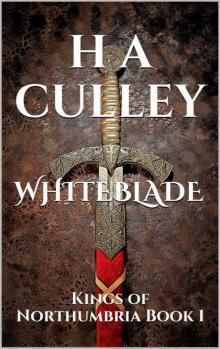 WHITEBLADE
WHITEBLADE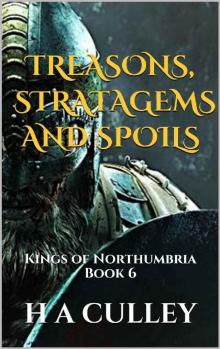 TREASONS, STRATAGEMS AND SPOILS: Kings of Northumbria Book 6
TREASONS, STRATAGEMS AND SPOILS: Kings of Northumbria Book 6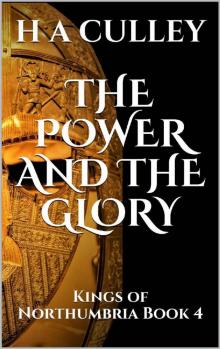 THE POWER AND THE GLORY: Kings of Northumbria Book 4
THE POWER AND THE GLORY: Kings of Northumbria Book 4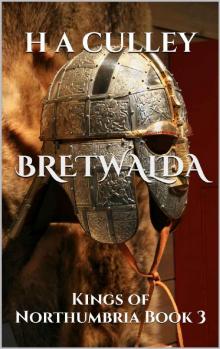 BRETWALDA: Kings of Northumbria Book 3
BRETWALDA: Kings of Northumbria Book 3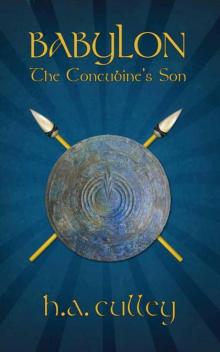 The Concubine's Son
The Concubine's Son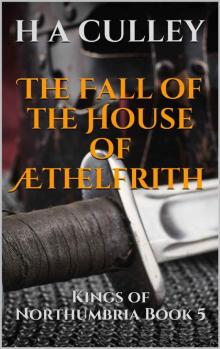 The Fall of the House of Æthelfrith: Kings of Northumbria Book 5
The Fall of the House of Æthelfrith: Kings of Northumbria Book 5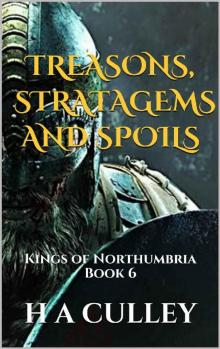 TREASONS, STRATAGEMS AND SPOILS
TREASONS, STRATAGEMS AND SPOILS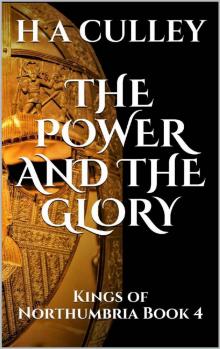 THE POWER AND THE GLORY
THE POWER AND THE GLORY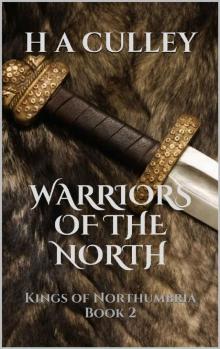 WARRIORS OF THE NORTH
WARRIORS OF THE NORTH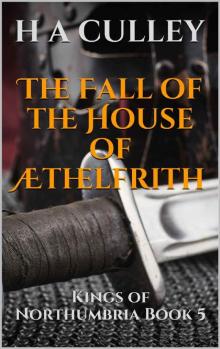 The Fall of the House of Æthelfrith
The Fall of the House of Æthelfrith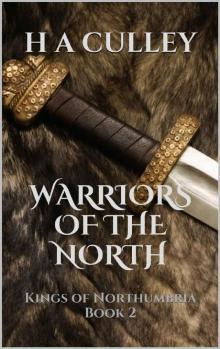 WARRIORS OF THE NORTH: Kings of Northumbria Book 2
WARRIORS OF THE NORTH: Kings of Northumbria Book 2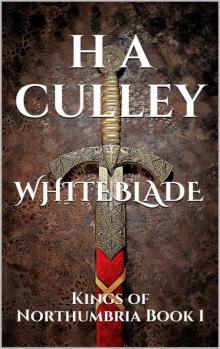 WHITEBLADE: Kings of Northumbria Book 1
WHITEBLADE: Kings of Northumbria Book 1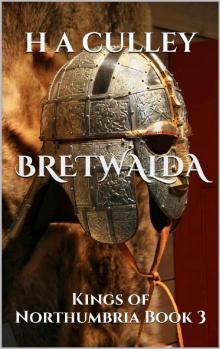 BRETWALDA
BRETWALDA